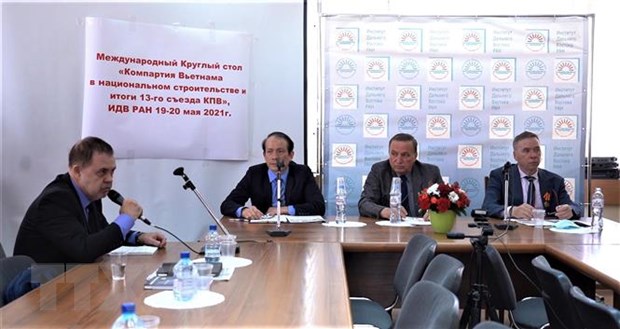Scholars and experts from Russia, France, Japan and Vietnam attended a roundtable held on May 20 to discuss the role of the Communist Party of Vietnam (CPV) in national construction as well as the outcomes of the CPV’s 13th National Congress, reported VNA.
 |
|
An overview of the event (Photo: VNA)
|
Addressing the event, held by the Centre for Vietnamese and ASEAN Studies in the Far East Institute at the Russian Academy of Sciences, Vietnamese Councillor in Russia Nguyen Tung Lam reviewed a number of achievements Vietnam has recorded since the “Doi Moi” (Renewal) process was launched in 1986 and the national development goals set at the CPV’s 13th National Congress.
He underlined Vietnam’s external policies of independence, self-reliance, multilateralisation, and diversification for peace, friendship, cooperation, and development.
Meanwhile, Chairman of the Council of Experts at the Eurasian Research Fund, Grigory Trofimchuk, said Vietnam has been persistent in implementing decisions made by Party congresses and has won the respect of the international community. This was shown in its effective performance as a non-permanent member of the UN Security Council in the 2020-2021 tenure, he said.
He underscored that Vietnam becoming a pioneer in cooperation with the Eurasian Economic Union (EAEU) has opened up new opportunities for the union.
Speaking to a Vietnam News Agency correspondent in Russia, Director of the Centre for Vietnamese and ASEAN Studies Vladimir Mazyrin said the 13th National Party Congress drew major attention as it was an important political event in Vietnam.
The congress was of special significance as it decided the socio-economic strategies for Vietnam for the next ten years and a longer strategy to 2045.
This is a sign of maturity in the CPV in both theoretical and practical aspects, as it sketched out missions for a very long term, he said.
Participants at the two-day roundtable heard nearly 30 speeches on historical, present, and future features of Vietnam in the fields of politics, external relations, economy, and society, along with recommendations to promote the Vietnam-Russia comprehensive strategic partnership./.
BTA